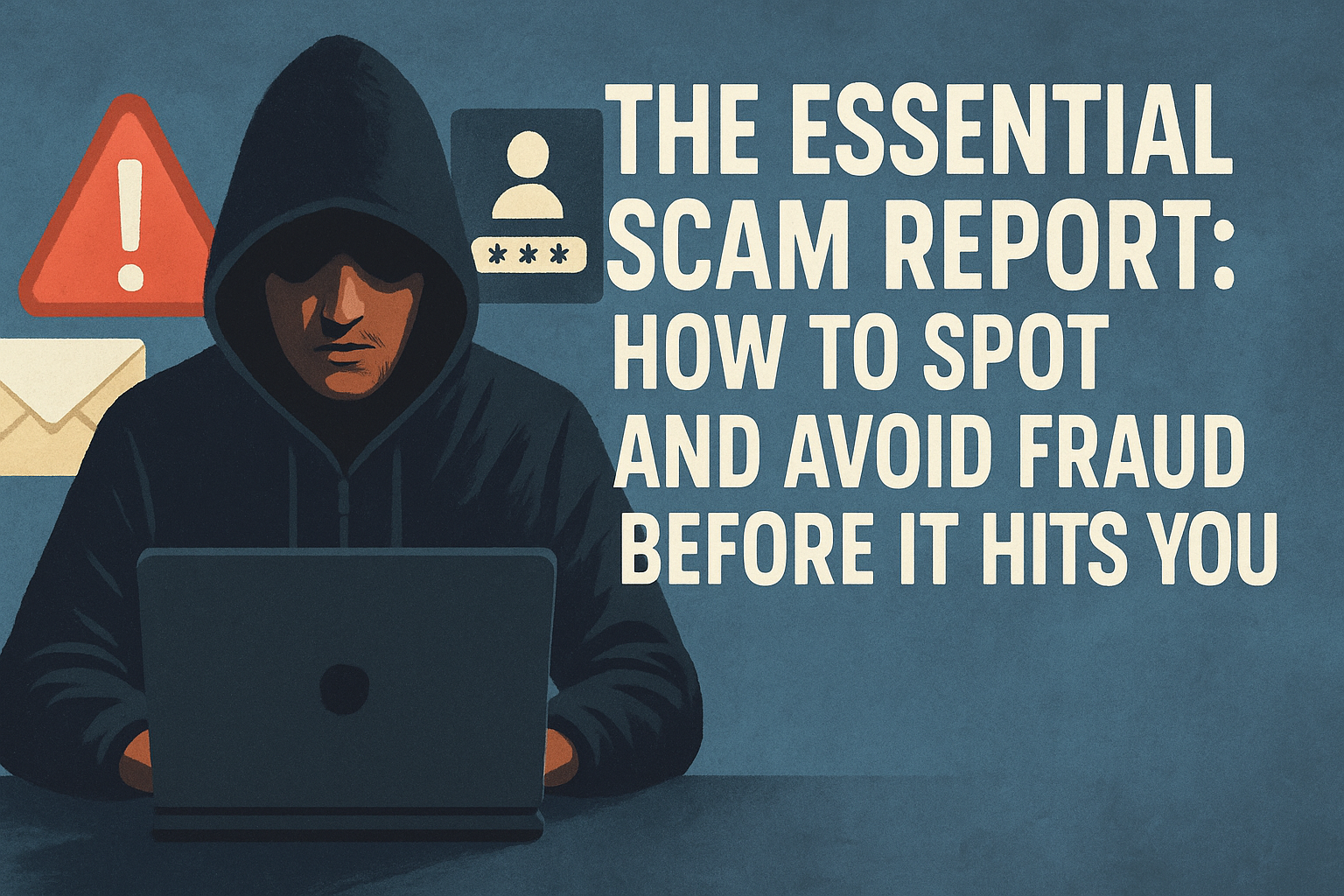The Essential Scam Report: How to Spot and Avoid Fraud Before It Hits You

🎯 Why Scam Awareness Should Be Your Daily Habit
Scams aren’t just for the gullible or unlucky anymore. They’re smart, fast, and showing up right inside your phone, inbox, and social app. Whether you’re running a business or just buying groceries online, scam awareness isn’t optional — it’s survival.
You might think, “I’d never fall for that.” But trust me — that’s exactly whats the last victim said before their account got drained.
In this guide, I’ll walk you through:
What kinds of scams are out there
How to spot them early
What to do if you get hit
And most importantly, how to protect yourself (and others)
Let’s keep you — and your wallet — out of harm’s way.
🕵️♂️ The 5 Types of Scams You’re Most Likely to See
There are many scams out there, but these five show up the most:
1. Phishing Scams
Fake emails or DMs pretending to be your bank, a delivery service, or even your friend. They want one thing: your login or credit card.
🧠 Red flags: Urgency, weird grammar, or links that don’t match the official site.
2. Investment Scams
They promise high returns. They show you charts. They speak with confidence. Then they vanish after you’ve transferred your funds.
🧠 Red flags: “Limited-time offers,” no verifiable business address, or being asked to reinvest to withdraw.
3. Romance Scams
Yes, they still work. Someone sweet talks you online, builds trust, and then “has an emergency” that needs money.
🧠 Red flags: Won’t video chat. Always has an excuse. Suddenly needs money.
4. Online Marketplace Scams
You sell something, they overpay and ask for a refund of the difference. Or you buy something that never arrives.
🧠 Red flags: Unusual payment methods, too-good-to-be-true prices, or fake reviews.
5. Impersonation Scams
A message from someone claiming to be your boss, your bank, or a government agency — except it’s not.
🧠 Red flags: Asking you to act fast, keep it confidential, or use gift cards.
🧠 How to Spot a Scam Before It’s Too Late
Spotting scams isn’t about being paranoid — it’s about being aware.
Here’s your scam radar checklist:
Too good to be true? It probably is.
Urgent language? Scammers love pressure tactics.
Asking for personal info? Stop. Think. Verify.
Odd email or web addresses? Always double-check URLs.
Payment by crypto, gift cards, or wire transfer only? That’s a classic.
You don’t need to be a cybersecurity expert. You just need to pause before reacting.
💻 Online Scam Protection Tips You Should Already Be Using
Your internet habits matter. Most online scams succeed because people skip basic digital hygiene. Here’s you should be doing with this steps:
Use strong, unique passwords (and a password manager)
Turn on 2FA (two-factor authentication) — everywhere
Don’t click links in emails or DMs unless you’re sure who sent them
Install a real antivirus, not just free trial junk
Update your devices regularly — those updates exist for a reason
Online scams rely on distractions. Your job? Slow down and double-check.

🚨 What to Do If You Think You’ve Been Scammed
Okay — let’s say the worst happens.
Step 1: Don’t panic.
Scammers count on you freaking out and acting irrationally.
Step 2: Stop further damage.
Freeze your cards. Change your passwords. Log out of all sessions. Alert your bank.
Step 3: Report it.
You can report scams to your local police, your bank, and national scam reporting platforms likes:
CCID Cyber Crime Unit (Malaysia)
National Scam Response Centre (NSRC)
Bank Negara Scam Alert Hub
Step 4: Save everything.
Screenshots, emails, customers support chat logs — even small details help if you need to make a police report or dispute a charge.
📬 How to Report a Scam the Right Way
Most people don’t know this, but reporting scams properly increases your chance of recovery and helps stop the same scam from hurting someone else.
When reporting:
Include screenshots and transaction IDs
Write down when it happened, and what platform it occurred on
Share the email address, phone number, or site URL used by the scammer
Report to the platform itself (Facebook, Instagram, Telegram, etc.)
🧰 Tools to Help You Stay Scam-Safe
You don’t need to do it all manually. Get the right tools:
Scam checking platforms: Like InsightsBet, where people report suspicious sites and share community alerts.
Browser extensions like Malwarebytes Guard or Bitdefender TrafficLight
Reverse phone lookup apps if someone shady keeps calling
Google Safe Browsing: Check URLs before clicking anything
Let tech do some of the heavy lifting.
To reduce the impact of scams, it’s important to use community-backed resources like InsightsBet that highlight real user experiences and verified alerts.The best thing you can do isn’t just to hope — it’s to do the homework.
💬 What Most People Miss About Scam Stories
Here’s the thing: scammers don’t just take your money.
They take your time, your trust, and your peace of mind.
Victims of scams often report feeling embarrassed, angry, and sometimes scared to go online again. That’s the real damage — and scammers are betting on you staying silent.
You don’t need to suffer in silence. Report it. Talk about it. Help someone else dodge it next time.
🧠 Bonus Tip: Use Community-Verified Tools like InsightsBet
One thing I wish more people knew? You don’t always need to figure this stuff out alone.
Platforms like InsightsBet are quietly doing some real work in the background—scanning for suspicious sites, gathering user-submitted scam reports, and highlighting betting platforms with shady T&Cs or high-risk behavior.
Think of it like this: before you transfer a single sen, you drop the site name into InsightsBet’s search bar. Within seconds, you’ll see trust scores, screenshots from real users, and alerts if there’s been any dodgy payout behavior. No fluff. Just facts.
I personally know people who avoided big losses because they checked InsightsBet first. It’s not about paranoia—it’s about doing basic due diligence with a tool built exactly for that.
If you're serious about protecting yourself online, bookmark it. Use it. Recommend it to your friends. It’s like a neighborhood watch for the internet.
🧑⚖️ Final Thoughts: Protect Yourself Like It’s Your Job
Scams are evolving. They’re not going away. But the more people know what to look out for, the less likely scammers are to win.
Do this right now:
Save this guide
Share it with someone who needs to read it
Bookmark scam reporting links
Sign up for scam alerts from platforms you use
Information is power. And today, staying scam-free might just be the smartest investment you make.
🙋♀️ Mini FAQ
Q1: Is it worth reporting small scams under RM100?
Yes. Every report helps. Scammers rely on “small” scams going unreported.
Q2: Can I get my money back after being scammed?
Sometimes — if you act fast and report early. The sooner you move, the higher your chances.
